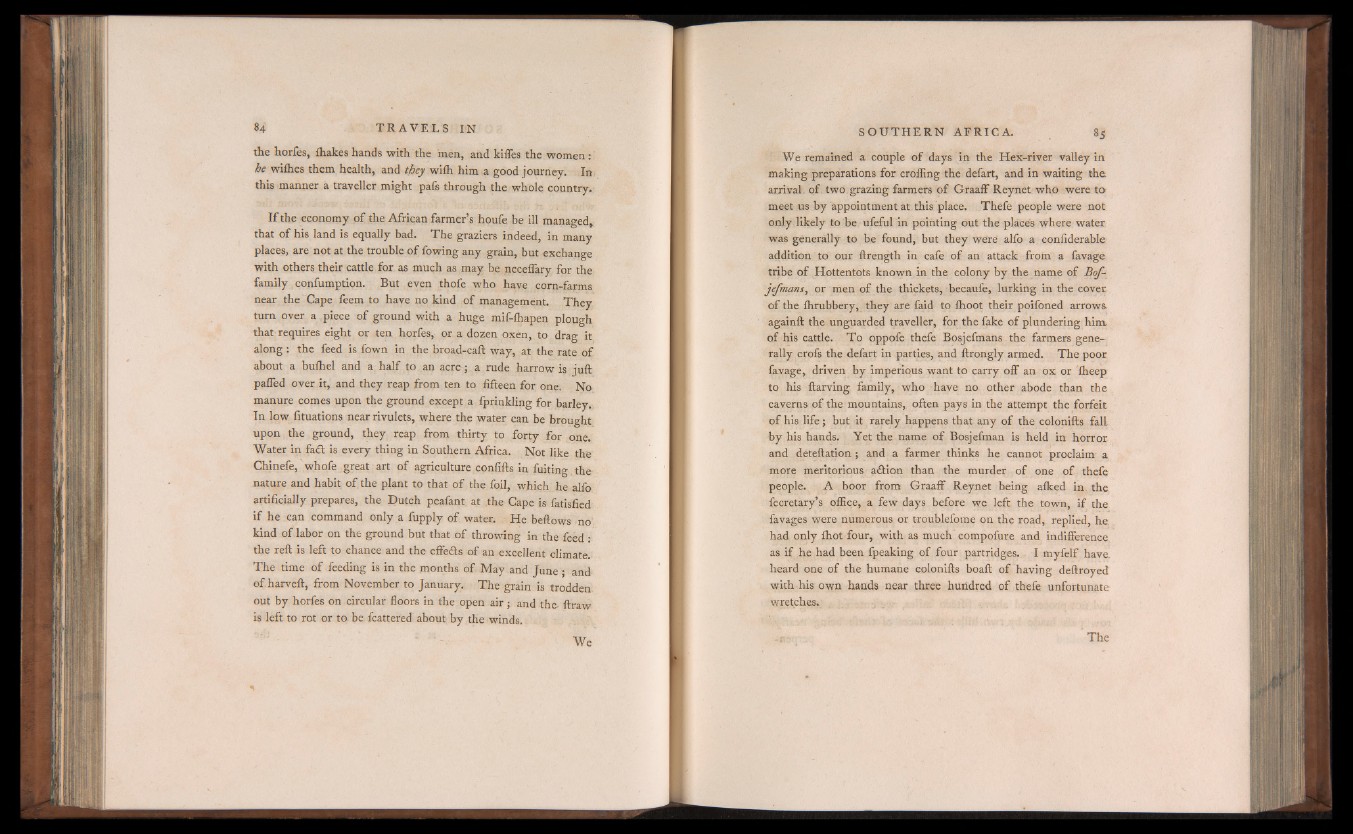
the horfes, ihakes hands with the men, and kifles the women :
he wiihes them health, and they wiih him a good journey. In
this manner a traveller might pafs through the whole country.
I f the economy o f the African farmer’s houfe be ill managed,
that of his land is equally bad. The graziers indeed, in many
places, are not at the trouble o f fowing any grain, but exchange
with others their cattle for as much as may be neceflary for the
family confumption. But even thofe who have corn-farms
near the Cape feem to have no kind o f management. They
turn over a piece of ground with a huge mif-fhapen plough
that requires eight or ten horfes, or a dozen oxen, to drag it
along : the feed is fown in the broad-caft way, at the rate o f
about a bulhel and a half to an acre ; a rude harrow is juft
palled over it, and they reap from ten to fifteen for one. No
manure comes upon the ground except a fprinkling for barley.
In low fituations near rivulets, where the water can be brought
upon the ground, they reap from thirty to forty for one.
Water in fadt is every thing in Southern Africa. Not like the
Chinefe, whofe great art of agriculture confifts in fuiting the
nature and habit o f the plant to that of the foil, which he alfo
artificially prepares, the Dutch peafant at the Cape is fatisfied
i f he can command only a fupply of water. He bellows no
kind of labor on the ground but that o f throwing in the feed .-
the reft is left to chance and the effefts of an excellent climate.
The time of feeding is in the months of May and June ; and
of harveft, from November to January. The grain is trodden
out by horfes on circular floors in the open air; and the- ftraw
is left to rot or to be fcattered about by the winds.
We
We remained a couple of days in the Hex-river valley in
making preparations for crofiing the defart, and in waiting the
arrival, of two grazing farmers of Graalf Reynet who were to
meet us by appointment at this place. Thefe people were not
only likely to be ufeful in pointing out the places where water
was generally to be found, but they were alfo a confiderable
addition to our ftrength in cafe o f an attack from a favage
tribe of Hottentots known in the colony by the name of Bof-
jefmans, or men of the thickets, becaufe, lurking in the cover
of the ihrubbery, they are faid to Ihoot their poifoned arrows
againft the unguarded traveller, for the fake of plundering him
of his cattle. To oppofe thefe Bosjefmans the farmers generally
crofs the defart in parties, and ftrongly armed. The poor
favage, driven by imperious want to carry off an ox or fheep
to his ftarving family, who have no other abode than the
caverns of the mountains, often pays in the attempt the forfeit
of his life; but it rarely happens that any of the colonifts fall
by his hands. Yet the name o f Bosjefman is held in horror
and deteftation ; and a farmer thinks he cannot proclaim a
more meritorious aition than the murder of one of thefe
people. A boor from Graaff Reynet being afked in the
fecretary’s office, a few days before we left the town, if the
favages were numerous or troublefome on the road, replied, he
had only fhot four, with as much compofure and indifference
as if he had been fpeaking of four partridges. I myfelf have,
heard one of the humane colonifts boaft of having deftroyed
with his own hands near three hundred of thefe unfortunate
wretches.